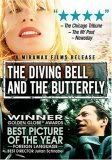
May 14, 2008
Le Scaphandre et le Papillon (The Diving Bell and the Butterfly) (2007)
This film follows Jean-Dominique Bauby (Mathieu Amalric (The Story of Richard O)) who is struck down by a stroke. Bauby wakes in a hospital bed, completely paralyzed with the exception of his eyes. He copes with his debilitation and finds a way to still experience life. With the help of his physical therapist, Bauby writes a book, the one from which the film is based. He communicates the text by blinking his left eye. His story is certainly one of perseverance. A majority of the film is shown from his point-of-view, meaning from a bed behind his blinking solitary eye. This may seem gimmicky, but it turns out to be a striking dramatic tool. The reason a person is going to read the book or see the film is to satisfy the fear of disability. Like it or not, there’s the whole “I hope that never happens to me” element in approaching this movie. Director Julian Schnabel (Before Night Falls) makes a brilliant choice by putting the audience in the hospital bed, with blurry vision, people swooping in from all direction. This choice has a solid dramatic punch. When Bauby loses one of his eyes to infection, literally cutting his functioning body by 50%, it is sewn up by a dismissive doctor. Schnabel puts the audience behind Bauby's eyelid as the final seconds of sight from that eye is taken from him as he pleads for mercy. In addition, we are kept from seeing Bauby until he himself has a chance to view his own face in a distorted reflection. This slow reveal heightens Bauby’s terror and fully shows the man’s circumstance. High credit goes to Schnabel for working Bauby's peril to full dramatic effect.
The film is more than just seeing the world through Bauby's eye and playing off common fears. Once this is covered, Schnabel moves to Bauby's life and how those around him have reacted to the tragedy. It becomes clear that many of Bauby's associates are ill equipped to dealing with this level of a change in their friend. The film loses some air at this point since Schnabel loses his device of using Bauby's point-of-view, but the stilted interactions between Bauby and others still is fascinating. The relationship between Bauby and his estranged wife and their children is particularly interesting. Where the film really hits its stride are with the scenes between Bauby and his father, played by Max von Sydow (The Adventures of Bob & Doug Mckenzie: Strange Brew). Von Sydow perfectly displays the torment of a parent who is forced to see their child in pain. Nearing the end of his own life, Bauby’s father has his son drift away slowly in a bed far away. Unable to visit his son, he is forced to say his goodbyes over the phone. If for no other reason, this film is worth the price of admission to witness the moving scenes between Sydow and Amalric as father and son.
Overall this is not a brilliant film but it is a well crafted and touching one. Bauby's struggle is plainly shown and done so with intelligence and care. Most movies treat the disabled with kid gloves and in completely sympathetic light, this movie does Bauby the honor of showing him warts and all - treating him as a real person, not just as a disability.
Cautions: This film does contain full frontal male nudity. Bauby is shown being bathed and this scene is very frank with his nudity. There's also bad language and constant reference to Bauby's strained relationship with his wife (due to an affair).
Worldview: As he becomes more communicative and settles into a routine, Bauby is taken to a priest by his physical therapist who is a “devout Christian”. Instead of the usual reaction, Bauby remains unimpressed by the church and denies God. While this is contrary to the reaction one would expect normally, if you listen to Bauby’s words and review his life it isn’t terribly shocking. He was a European elite and acted as such. This refutation of God is the film’s only contact with the deity.
In the end of the film, Bauby’s publication of the book is presented as a majestic feat. To be fair, of course, it was an arduous task but in reality the only reason it was published was because he was a well connected European elite. If he had been a fisherman or baker with the same aliment, it would be doubtful the same book would make it past the proposal stage.
The feat of publishing a book falls somewhat flat as a grand result of his torment. His person seemed to remain unchanged, there was no revelation, no resounding altering of his heart. If he had listened more closely to God knocking at the door, a transformation could have taken place. Yes, he was stuck in the “diving bell” of his motionless body but the change into a butterfly never appeared to have happened – he simply ended up an author.
Related Reviews:
Movies about the disabled
The Sea Inside (2004)
Murderball (2005)
Other Critic's Reviews:
The Austin Chronicle
Film-Forward
Labels: film, French cinema, Mac von Sydow, Mathieu Amalric, movie review
Share
Previous Posts




Good News Film Reviews LLC 2004-2010 - used with permission
Images, video and titles are the property of their respective copyright holders. Good News Film Reviews LLC claims no ownership or connection to them.
The views expressed on this site are not the opinion of any advertiser or external entity.
While we take care to only link to responsible entities, Good News Film Reviews LLC takes no responsibility for the content linked from this site. There are sharks in the waters. Surf at your own risk.
The Template is generated via PsycHo and is Licensed.






















0 Comments:
Post a Comment
<< Home